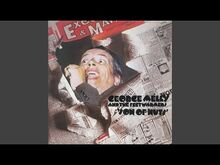
George Melly (1926-2007) was a jazz singer and musician, an art critic, collector and lecturer, and a journalist and writer. He achieved media celebrity in the 1960s through his TV criticism for the Observer, together with regular BBC appearances on arts programmes and chat shows, where he displayed his talent as a raconteur. He also wrote a number of well-received books, among them Owning Up, an autobiography, and Revolt Into Style, subtitled The Pop Arts in Britain. A lifelong and unrepentant bohemian with a love of jazz, blues and Surrealist art, he was very much associated with the libertarian, "permissive" atttitudes of the London media of the 1960s. Having grown up in the 1940s, he was too old to be part of the 1960s generation, but he approved of much of the youth culture of that era, although with a detached, sometimes more critical point of view.
Like John Peel, he was born in the Liverpool area to a middle-class family; his father worked as a wool broker (Peel's father was a cotton broker) and his mother nurtured his interest in art and literature. Like Peel, he received a public school education (at Stowe School), did military service (in the Royal Navy in the final years of World War Two, a period which he decribes in his memoir Rum, Bum and Concertina). and, like Peel, was considered unsuitable "officer material" despite his public school background and had to serve in the ranks. He too became deeply involved in music - in his case, as a flamboyant traditional jazz singer, influenced by the blues legend Bessie Smith. With the decline in popularity of jazz in the 1960s, Melly retired from performing to concentrate on his journalism, only to return to live gigs in the early 1970s, winning a record contract with Warner Brothers for whom he recorded a couple of LPs, accompanied by John Chilton's Feetwarmers. During this period he recorded a Peel session - and as a result appears in the list of most unlikely session guests in Ken Garner's The Peel Sessions. He also guested as a vocalist on one track of the Stranglers' 1978 LP Black and White. Ken Garner notes (p. 308) that Melly's BBC contract files dated from 1954 and by 1992 stood six inches high.
His view of Peel was tolerant but critical. According to Asa Briggs' The History of Broadcasting in the United Kingdom (vol. 5, p.802):
In the [Radio Times] of 2 April [1970] there was a dialogue between [Sir William] Glock & [P. Howard] Newby on music on radio. [Douglas] Muggeridge (R1 & R2 Controller) defended the policy of Radios 1 & 2 in dialogue with George Melly, who asked for Radio 1 to 'broaden out a bit'. While he had found John Peel 'boring', he said, he had done 'something very admirable'. He had 'broken the division between pop music & culture in general'.
This remark was characteristic of Peel's supporters at the BBC in this period. He was seen as a cultural bridge-builder by critics and listeners who had little time for Radio One's mainstream output, and this factor may have enabled him to preserve his job at the BBC at a time when he had few allies in the Radio One hierarchy.
In one chapter of Revolt into Style Melly surveyed the leading DJs on Radio One, at the time still a relatively new station. He acknowledged Peel's originality but expressed scepticism regarding the authenticity of his Liverpool accent, saying that he preferred Kenny Everett's ingenuity and inventiveness to Peel's seriousness. Nevertheless, Peel and Melly shared a love of earlier forms of jazz and blues as well as sympathies for the counter-culture of the Underground, and both testified in favour of the defendants at the 1971 Oz obscenity trial.
Festive Fifty Entries[]
- None
Session[]
1. Recorded 1972-12-18, first TX 26 December 1972, no known repeat. No known commercial release. Credited with Fawkes-Chilton Feetwarmers.
- If You're A Viper / Trouble In Mind / Gimme A Pig Foot
Shows Played[]
- 25 December 1973: Buddy Bolden's Blues (LP - Son Of Nuts) Warner Bros.
